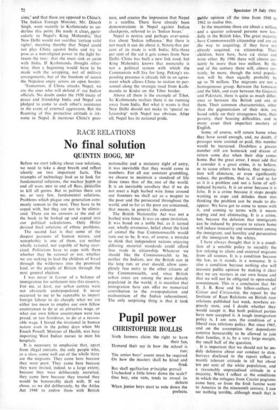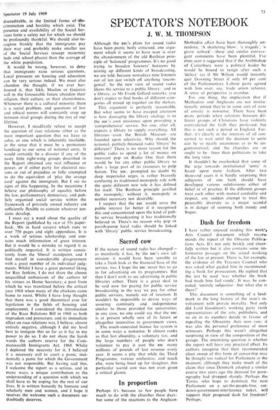RACE RELATIONS
No final solution
QUINTIN HOGG, MP
Before we start talking about race relations, we need to take a deep breath and reflect silently on two important facts. The triumphs of technology lead us to look for
fundamental solutions, the nuclear boltnb,to 'penicillin all wars, DDT to end all fleas, icillin to kill all germs. But in politics there are no, or very few, fundamental solutions. Problems which plague one generation com- monly remain to the next. They have to be coped with, but they are not to be elimin- ated. There are no answers at the end of the book to be looked up and copied into our political calculations. Only Hitler devised final solutions of ethnic problems.
The second fact is that some of the deepest passions of human nature, and xenophobia is one of them, are neither wholly rational, nor capable of being exor- cised. Politicians have to cope with them whether they be rational or not, whether we are seeking to lead the children of Israel through the wilderness into the promised land, or the people of Britain through the next general election.
I was never in favour of a balance of immigration for settlement into this country. For me, at least, our urban centres were not obviously underpopulated. It never occurred to me to be reputable to import foreign labour to do cheaply what we are either too mean to employ our own fellow countrymen to do at an attractive wage, or what our own fellow countrymen were too proud, or too fastidious, to do at a reason- able wage. I feared the irrational in human nature even in the palmy days when Mr Enoch Powell, Minister of Health, was busy importing West Indian nurses to man his hospitals.
It is necessary to emphasise that, apart from illegal entrants, the only people who, as a class, come well out of the whole story are the migrants. They came here because they were poor. They came here because they were invited, indeed, to a large extent, because they were deliberately recruited, they came here because they trusted they would be honourably dealt with. If we chose, as we did deliberately, by the Attlee Act 1948 to endow them with British nationality and a statutory right of entry, it was inevitable that they would come in numbers. For all our constant grumbling, we choose to maintain a standard of life three times that of the_ rest of the world. It is an inevitable corollary that if we do not erect a high barbed wire fence around our frontiers we shall act as a magnet to the poor and the persecuted throughout the world, and so far as the poor are concerned, that means, in general, the coloured.
The British Nationality Act was not a barbed wire fence. It was an open invitation. It was based on a noble but, as it turned out, wholly erroneous, belief about the kind of animal the free Commonwealth would turn out to be. It was, of course, a mistake to think that independent nations enjoying differing material standards could afford free trade in citizenship. Whatever we should like the Commonwealth to be, neither the Indians, nor the British can in the long run, or ever should, allow com- pletely free entry to the other citizens of the Commonwealth, and, since British urban areas are among the most densely populated in the world, it is manifest that immigration here can offer no numerical contribution to the overpopulation and malnutrition of the Indian subcontinent. The only surprising thing is that it took togablic opinion all the time from 1948 to 1962 to realise this.
In the meantime there are about a million and a quarter coloured persons now law- fully in the British Isles. The great majority have Commonwealth citizenship and are on the way to acquiring, if they have not already acquired, tac citizenship. Their children, born here, have in( status and none other. By 1986 there will almost cer- tainly be more than two million. By the end of the century there will, almost cer- tainly, be more, though the total popula- tion will by then equally probably be up to 70 million. The migrants are not a homogeneous group. Between the Jamaican ,.and the Sikh, and even between the Gujarati and Pakistani, there is quite as much differ- ence as between the British and any of them. Their common characteristics, other than the pigmentation of their skin, are based solely on their strangeness here, their poverty, their housing difficulties, and in many cases their imperfect mastery of English.
Some, of course, will return home when they have saved enough, and, no doubt, if passages were assisted or paid, this number would be increased. Doubtless a greater number still are homesick and dream of return some day when their ship comes home. But the great error, I must add that I consider it a great crime, is to believe, or to cause others to believe, that repatria- tion will eliminate, or even significantly reduce, the problem, that is, if and so far as it is a problem and not a form of self- induced hysteria. It is an error because it is false. It is a crime because it stops people wanting to cope and deludes them into thinking the problem can be made to dis- appear. We have got to come to terms with it, and coming to terms with it means coping and not eliminating. It is a crime, too, because the delusion that immigrants can be induced by pressure to return home will induce insecurity and resentment among the immigrant, and hostility and persecution of the immigrant by the whites.
I have always thought that it is a condi- tion of a sensible policy to recodify the law relating to aliens and external migrants from all sources. It is a condition because the law, as it stands, is a nonsense. It is also a condition because nothing else will reassure public opinion by making it clear that we are masters in our own house and that we will not be obligated to open-ended commitment. This is a conclusion that Mr E. J. B. Rose and his fellow-authors of Colour and Citizenship, the report by the Institute of Race Relations on British race relations published last week, nowhere ex- pressly state, and I doubt whether they ?would accept it. But both political parties have now accepted it. A tough immigration policy is, I am sure, the condition of a liberal race relations policy. But since 1965, and on the assumption that dependants contrive honourably to be allowed to join their families, it is, by a very large margin, the small half of the question.
It is important that we should not be un- duly defensive about our conduct to date. Surveys disclosed in the report reflect a mainly tolerant attitude in all but about ten per cent of the white population, and a reasonably unprejudiced attitude in a majority. When I reflect at the conditions in which the refugees from Czarist pogroms came here, or from the Irish famine went to America in the nineteenth century, I can see nothing terrible, although much that is discreditable, in the limited forms of'411s- crimmation and hostility which exist. The presence and availability of the Social Ser- vices form a safety net for which we should be profoundly thankful. We should also'te- cognise frankly that the immigrants pay their way and probably make smaller use of the Social Services (except maternity beds and school places) than the average of the white population.
It would be wrong, however, to dehy that immigrants raise serious questions. Local pressures on housing and education can be very serious indeed. We must also abandon the thought, if we ever har- boured it, that Sikh, Muslim or Gujarati will in the foreseeable future abandon their religion, their culture, or their clannishness. Whenever there is a cultural minority there is a social problem, and questions of law and ethical norms will constantly crop up between rival groups during the rest of our lifetime.
However, I steadfastly refuse to accept the question of race relations either as the most important question that we have to solve, or one which is inherently insoluble, in the sense that it must be a permanent handicap to our sense of national unity. It would certainly be a disaster if any of the nasty little right-wing groups described in the Report obtained any real influence or power, or if either party for electoral rea- sons or out of prejudice or folly attempted to do the equivalent of 'play the orange card' against the immigrant. But I see no signs of this happening. In the meantime I believe our philosophy of equality before the law, parliamentary democracy, and pub- licly organised social service within the framework of privately owned industry are sufficiently flexible to contain whatever ten- sions develop.
I must say a word about the quality of the Report (published by out' at 55s paper- back, 90s in hard covers) which runs to over 750 pages and eight appendices. It is a work of serious scholarship, and con- tains much information of great interest. But it would be a mistake to regard it as politically impartial. It is written consis- tently from the 'liberal' standpoint, and I find myself in considerable disagreement with a great number of its individual judg- ments. Whilst I have a great personal liking for Roy Jenkins, I do not share the almost unqualified enthusiasm of the authors tif his virtues as Home Secretary, a post from which he was translated before the critical year 1968 when many of the chickens came home to roost. Whilst I have long thought that there was a good theoretical case for legislation in the fields of housing and employment, I considered the introduction of the Race Relations Bill in 1968 as both imprudent and premature, and its immediate effect on race relations was, I believe, almost entirely negative, although I did my level best to instigate this so far as it lay in my power to do so. I do not share the harsh words the authors reserve for the Com- monwealth Immigrants Act, 1968. Whilst I deplored the necessity for it, I believed it a necessary evil to avert a panic, inci- dentally a panic for which the Government was not responsible. But having said this, I welcome the report as a serious, and in many ways, a unique contribution to the understanding of a question with which we shall have to be coping for the rest of our lives. It is written honestly by humane and scholarly men and women, and I hope it receives the welcome such a document un- doubtedly deserves.



































 Previous page
Previous page